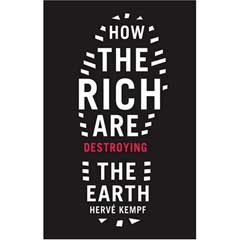
Lately it seems almost too easy to be optimistic about the future of our country's role in national and international affairs. With a new progressive president in the White House and a recession that exemplifies the egregious hubris with which the former administration conducted its business, it seems the gods have vindicated liberal America in its quest for more widespread opportunity and greater environmental awareness.
Yet, pessimism also seems too simple a response to our condition. Such connected and unprecedented financial, environmental and political challenges arguably require a type of stoic realism to best confront them. This is the outlook of French journalist Hervé Kempf in his book How the Rich are Destroying the Earth.
As Kempf demonstrates, this is neither occasion for complacency or leisure, nor for resignation to the same old hardships. This moment, as it happens, is a crucial juncture in Western society's journey into itself, into the reasons for its widespread environmental harm and into the solutions that must come if we are to look future generations in the eye on our deathbeds.
However, this outlook must be contextualized beyond the historically limited universe of party politics and global warming. Essentially the issue becomes that of the Faustian dilemma: American culture in the era of neoliberalism has made a deal with the Devil in being the most wasteful consumer on the planet, indeed feeling entitled to such excess.
Many, if not most, Americans understand this, especially how it fits into the greater narrative of Manifest Destiny. The challenge comes in relinquishing such indulgence for the good of our ancestors and our proverbial soul. The question is: Can we do it?
Kempf believes we can if we heed the thought of Thorstein Veblen, the early 20th century economist who articulated the mechanism of conspicuous consumption in his Theory of the Leisure Class (1899). "For Veblen," Kempf explains, "the economy is dominated by a principle: 'the propensity for emulation -- for invidious comparison -- is of ancient growth ... a pervading trait of human nature.'" This is an ominous observation.
Kempf asserts that Veblen's foreboding contribution -- despite its near prophetic prognosis of the Great Depression, which followed its publication by 30 years -- has been strategically ignored throughout the 20th century because of its threat to the dogma of neoliberalism.
Evidence of this can be seen in not only Obama's administrative appointments of Clintonite free traders, but also in recent books that similarly link issues of the environment and the economy.
For ultimately, while titles like Hot, Flat and Crowded and The Green Collar Economy declare that global warming is an opportunity for renewed economic growth, Kempf's tract by contrast represents the audacious hope that we, the rich, will finally see the folly of our ways.
Comments